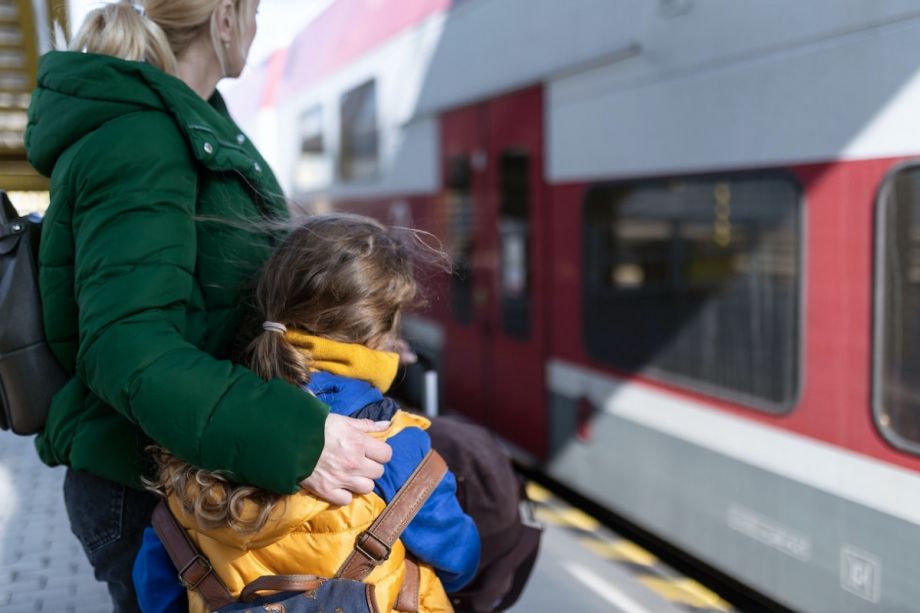In 2006, a transit agency serving the communities adjacent the Sacramento and San Joaquin River Delta claimed to be the first in the U.S. to provide a dedicated space for people to park strollers as they rode a bus.
Tri Delta Transit, which serves northeastern Contra Costa County in the San Francisco Bay Area, created the zone because it noticed more families riding with strollers. “We recognized the difficulty they encounter when required to fold their strollers and felt there was more we could do to make their experience easier and more enjoyable,” said the agency’s outgoing CEO Jeanne Krieg, herself a parent, in a press release issued that year.
“[Riding the bus] can prove difficult to someone who must manage not only a child in a stroller, but a bag of groceries and perhaps an accompanying toddler or two,” the 2006 press release added.
Much has changed since then. The birth rate nationwide is declining, in part because it is growing much more expensive for a prospective parent to take care of a child while also taking care of themselves. And the pandemic, combined with safety concerns, has fueled a decline in transit ridership, particularly among women riders in some cities such as Los Angeles and the Twin Cities. The pandemic also pushed transit drivers to leave faster than agencies could hire their replacements, resulting in fewer, more crowded buses on the road with little room for families.
Meanwhile, many transit systems in the U.S. are run mostly by men. These agencies are slow to make changes to ensure women and families feel welcome on public transit, whether through policy, service or seating layout adjustments.
“People look at transportation, and transit through the lens of home to work and work to home,” says Jessica Meaney, executive director of Los Angeles-based transportation and land use advocacy organization Investing In Place. “Other countries have really widened that perspective to look at how we get kids to school, how we get people to health care, how we get to the grocery store, how we get to the park, how we live our lives.”
Investing in Place worked with several local women’s groups to understand the experiences of low-income and immigrant women as they got around in the Los Angeles area. The organization recruited low-income and Spanish-speaking women to audit six routes in its service area, and found in a report it released in September 2022 that many riders believed service was unreliable and waiting areas were uncomfortable. They wanted more frequent, reliable, fast, and fare-free buses that had adequate room, shade, and shelter to wait in.
The organization also advised Los Angeles Metro in developing a plan to ensure women and their families feel safe and welcome using their system. The agency’s five-year effort began in 2017 when it convened a Women and Girls Governing Council to understand how women use its system. A report Metro published in 2019 found women, who travel predominately for household chores, school or daycare, and often while caring for other people, bore the brunt of transportation costs and harassment yet received the least help.
The agency outlined what it would do to support women and families on transit with its Gender Action Plan, quietly released in October. The plan calls for collecting data disaggregated by gender to understand how policy changes would affect people of different genders; building out restrooms with specific amenities; prioritizing household-serving entities such as grocery stores and childcare at transit stations, providing real-time arrival and bus crowding information; and following in Tri Delta Transit’s footsteps in redesigning buses’ seating layout to support riders who bring aboard unfolded strollers.
“It just boils down to basic infrastructure,” says Meaney. “If you build it for people traveling with small children or aging adults or somebody who might be using a wheelchair, I think things tend to benefit all of us.”
But even with Tri Delta’s stroller zones, those who need it might not necessarily be able to use it. “[Sometimes there’s] older people sitting [by the stroller zone] with bags,” says Jasmine Williams, who uses Tri Delta Transit every day to pick up and drop off her children, all under 10 years old.
Sometimes they may not be allowed to ride because the bus is full and they can’t fold up their stroller, Williams and her companion, Greg Evans, told Next City while waiting for the bus by the Somersville Towne Center in Antioch one sunny January afternoon.
Meanwhile, before Metro’s Gender Action Plan came out, the transit agency implemented changes to reduce the burden on women and families. This included installing decals on its buses to ask passengers to cede their seats to people who are pregnant, following similar efforts by San Francisco Bay Area Rapid Transit District and the Chicago Transit Authority. (BART installed similar decals, while CTA mails pin buttons to those expecting.) They also are working on a multiyear plan to increase transit service during the midday, evening and weekends, and have also removed restrictions on the number of youth up to 6 years old that can ride for free with a paying adult.
While Los Angeles figures out how to implement the rest of its plan, other agencies have taken action. DASH, the Alexandria, Virginia, transit agency known as “Driving Alexandria Safely Home,” implemented a service change in 2021 to also serve midday trips, instead of just commuter trips to Washington, D.C.
DASH’s Director of Planning and Marketing Martin Barna says the agency saw more diverse riders riding for different purposes, including families, during the midday. “Making bus service more frequent and more useful during those periods was a big step towards making it more family friendly,” she says.
The agency changed its stroller policy to allow them to be stowed on one of two wheelchair securement areas on board their buses, like what Tri Delta does. Before the change, DASH required strollers to be folded up.
“Obviously that can be a really challenging situation for parents, or for whoever’s bringing a child on board to have to balance the child and grocery bags and then also have the stroller and have to put [it under] the seat,” says Barna. “So we recognize that was kind of a barrier to riding DASH.”
Both DASH and Tri Delta stress that people who use wheelchairs will continue to have priority access to their securement areas. And although DASH has not reported any issues with having to leave people in wheelchairs behind because the wheelchair zone was occupied by people with strollers who will not move, the same can’t necessarily be said elsewhere.
And, thanks to funding from the city of Alexandria, it was able to make its system free for four years. This also allowed the agency to implement all-door boarding. The agency says both of these initiatives combined allowed them to speed up service and hopefully make it more accessible to families, especially those who tote around with children.

H. Jiahong Pan 潘嘉宏 (pronouns: they/them/佢/他) is a Minneapolis-based introverted freelance journalist who reports primarily on their lifelong passion: transportation issues. Find them on a bus of all types, the sidewalk, bike lane, hiking trail or perhaps the occasional carshare vehicle, camera and perhaps watercolor set or mushroom brush in tow, in your community or state or regional park regardless of season. If you can’t find them, they’re probably cooking, writing, curating an archive of wall art or brochures, playing board games, sewing or cuddling with their cat.
















